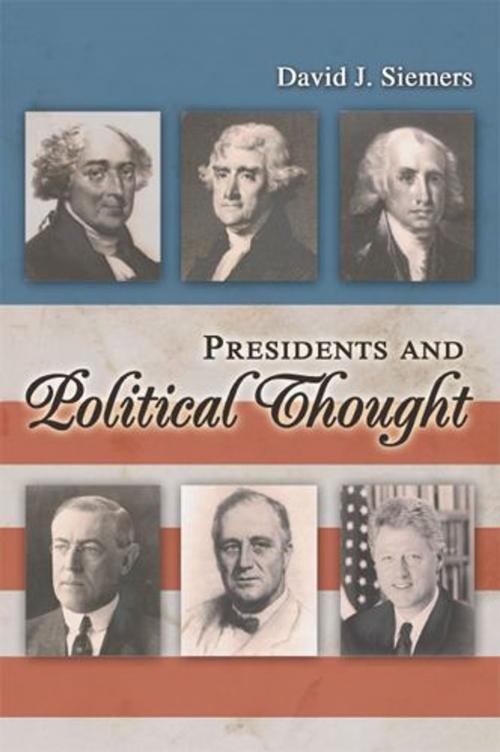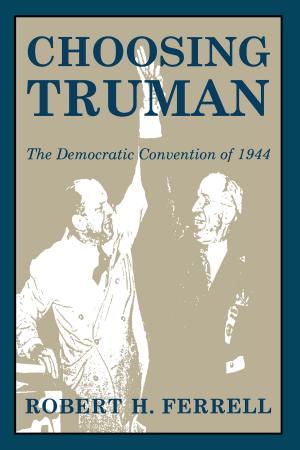Presidents and Political Thought
Nonfiction, Social & Cultural Studies, Political Science, Government, History, Americas, United States| Author: | David J. Siemers | ISBN: | 9780826272058 |
| Publisher: | University of Missouri Press | Publication: | January 1, 2010 |
| Imprint: | University of Missouri | Language: | English |
| Author: | David J. Siemers |
| ISBN: | 9780826272058 |
| Publisher: | University of Missouri Press |
| Publication: | January 1, 2010 |
| Imprint: | University of Missouri |
| Language: | English |
“What did the president know and when did he know it?” takes on a whole new meaning in Presidents and Political Thought. Though political philosophy is sometimes considered to be dry and abstract, many of our presidents have found usable ideas embedded within it. In this first comparative study of presidents and political theory, David Siemers examines how some of them have applied this specialized knowledge to their job.
Presidents and Political Thought explores the connection between philosophy and practical politics through a study of six American chief executives: John Adams, Thomas Jefferson, James Madison, Woodrow Wilson, Franklin D. Roosevelt, and Bill Clinton. Writing at the intersection of politics, history, and philosophy, Siemers combines his extensive understanding of political philosophy with careful research and analysis of individual presidents to produce provocative and astute judgments about how their understanding of political theory affected their performance.
Each chapter examines a particular president’s attitude about political theory, the political theorists he read and admired, and the ways in which he applied theory in his activities as president. Viewing presidents through the lens of political theory enables Siemers to conclude that Madison and Adams have been significantly underrated. Wilson is thought to have abandoned his theoretical viewpoint as president, but actually, he just possessed an unorthodox interpretation of his favorite thinker, Edmund Burke. Often thought to be so pragmatic or opportunistic that they lacked any convictions, FDR and Clinton gained their orientations to politics from political theory. These and other insights suggest that we cannot understand these presidencies without being more aware of the ideas the presidents brought to the office.
Siemers’s study takes on special relevance as the United States experiences regime change and a possible party realignment because, as he notes, Barack Obama has read and learned from political theory, too.
Avoiding much of the jargon that often accompanies political theory, this book demonstrates the relevance of political theory in the real world, chronicling both the challenges and potentially rich payoffs when presidents conceive of politics not just as a way to reward friends and punish enemies, but as a means to realize principles.
“What did the president know and when did he know it?” takes on a whole new meaning in Presidents and Political Thought. Though political philosophy is sometimes considered to be dry and abstract, many of our presidents have found usable ideas embedded within it. In this first comparative study of presidents and political theory, David Siemers examines how some of them have applied this specialized knowledge to their job.
Presidents and Political Thought explores the connection between philosophy and practical politics through a study of six American chief executives: John Adams, Thomas Jefferson, James Madison, Woodrow Wilson, Franklin D. Roosevelt, and Bill Clinton. Writing at the intersection of politics, history, and philosophy, Siemers combines his extensive understanding of political philosophy with careful research and analysis of individual presidents to produce provocative and astute judgments about how their understanding of political theory affected their performance.
Each chapter examines a particular president’s attitude about political theory, the political theorists he read and admired, and the ways in which he applied theory in his activities as president. Viewing presidents through the lens of political theory enables Siemers to conclude that Madison and Adams have been significantly underrated. Wilson is thought to have abandoned his theoretical viewpoint as president, but actually, he just possessed an unorthodox interpretation of his favorite thinker, Edmund Burke. Often thought to be so pragmatic or opportunistic that they lacked any convictions, FDR and Clinton gained their orientations to politics from political theory. These and other insights suggest that we cannot understand these presidencies without being more aware of the ideas the presidents brought to the office.
Siemers’s study takes on special relevance as the United States experiences regime change and a possible party realignment because, as he notes, Barack Obama has read and learned from political theory, too.
Avoiding much of the jargon that often accompanies political theory, this book demonstrates the relevance of political theory in the real world, chronicling both the challenges and potentially rich payoffs when presidents conceive of politics not just as a way to reward friends and punish enemies, but as a means to realize principles.















